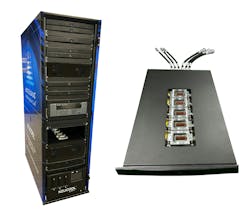Accelsius and iM Data Centers Demo Next-Gen Cooling and Sustainability at Miami Data Center
The next generation of data center infrastructure has been reimagined with a radical new partnership between Accelsius and iM Data Centers.
Combining their expertise in innovative cooling and high-performance modular data centers, the two companies want to keep up with the increasing burden of HPC and AI workloads. What is at the core of this alliance is the launch of their joint solutions in iM’s data center in Miami, which is planned to be available in the first quarter of 2025.
In one of the United States' most networked cities, iM’s Miami data center is 100,000 square feet and built for scalable, renewable, and high-performance computing. Initially launching with a 10 megawatt (MW) critical capacity, there are plans to add up to an additional 40 MW, supported by two utility substations to guarantee power stability.
iM’s commitment to modernizing older facilities into energy efficient, green data centers makes the Miami data center a showpiece for their green data center plan, while their recently commissioned 100% modular Pittsburgh HPC Data Center highlights their goals for deploying modular, high-density computing environments
The Miami data center has the flexibility to grow in place with its critical power availability and is also set up to demonstrate high-performance liquid cooling, which is clearly a crucial component of next-generation high-density data centers.
Demonstrating Two-Phase Direct-to-Chip Liquid Cooling
Perhaps the most important component of the Miami data center is Accelsius’ NeuCool Thermal Simulation Rack (TSR) with built-in Load Simulation Sleds (LSS). It’s part of Accelsius’ direct-to-chip cooling solution, which directly addresses the cooling demands of HPC and AI chip deployments.
NeuCool is a two-phase liquid cooling technology with systems based on refrigerants and their high thermal efficiency. Having the demonstration rack available in the data center can give customers the ability to see and evaluate just what deploying the technology will entail.
The chip cooling is provided by an engineering cold plate level technology that works in a closed loop, and demonstrates the way Accelsius will provide energy conservation, scalability, control of the liquid environment, and of course, cooling.
The goal of the NeuCool platform demonstration is to show how the company's thermal management technology accommodates next-generation AI applications, while delivering the sustainability requirements of today’s data centers. Josh Claman, CEO of Accelsius described the announcement this way:
Accelsius’ mission at its core is to drive sustainable data center development and operations, making iM Data Centers a natural partner. This deployment in Miami marks the beginning of a strategic collaboration that will help reshape how data centers approach high-performance computing infrastructure with sustainability in mind.
Dr. Rich Bonner, CTO of Accelsius, speaks from Data Center World 2024.
Sustainability, Flexibility, Optimized, and Efficient
The Miami data center is not just an innovation laboratory for iM and Accelsius, but also a venue for the industry and customers to experiment with cutting-edge computing.
The project's modular infrastructure and scalable colocation options allow customers to get a feel for how next-generation HPC and AI deployments can be used. Some of the key takeaways from the announcement and the data center are:
- Cooling technology that is environmentally friendly.
- Modularity means flexibility and scalability.
- Location is still important and options that make location selection flexible are critical.
Michael Roark, CEO and founder of iM Data Center, said of this partnership:
This partnership further enables iM Data Centers to apply the most technologically advanced and efficient methods to support the most powerful GPU servers today and in the future. Our clients require cutting-edge technology to run next-generation applications, and our job is to deliver the most reliable and robust infrastructure to support those workloads.
Accelsius and iM Data Centers exhibited their products at SC24 in Atlanta, where visitors saw first-hand NeuCool’s two-phase cooling system. Attendees were able to explore the Tabletop Demonstrator — a miniature NeuCool stand — to see boiling and two-phase thermal operation in action to improve their understanding of how this refrigerant-based liquid cooling at the engineered cold plate level in a closed loop system actually functioned.
Industry Partnerships Make a Difference
Accelsius’ collaboration with iM Data Centers in data center architecture and operations is another example of the importance of industry partnerships to the future of data centers. High density computing is in demand, be it for HPC or AI, and the addition of advanced cooling technologies such as NeuCool will be essential for sustainability and efficient data center operation. The modular design philosophy of iM Data Centers provides a demonstration of an adaptable solution for rapidly changing market demands.
The Miami data center can be considered both a technology testbed and a model for future data center development. Sustainable, scalable and with high availability and adequate power and cooling, this facility demonstrates that industry collaborations can make a difference. And why we will see more collaborative efforts in the industry making a difference in data center futures.
Miami Data Center Developments Update
Miami has recently witnessed several significant developments and investments in its data center sector, underscoring the city's growing importance as a digital infrastructure hub. Notable projects include:
Project Apollo: A proposed 15-megawatt (MW), two-story, 75,000-square-foot data center in unincorporated Miami-Dade County. With an estimated investment of $150 million, construction is slated to commence between 2026 and 2027. The development team has prior experience with major companies such as Amazon, Meta, and Iron Mountain.
RadiusDC's Acquisition of Miami I: In August 2024, RadiusDC acquired the Miami I data center located in the Sweetwater area. Spanning 170,000 square feet across two stories, the facility currently offers 3.2MW of capacity, with plans to expand to 9.2 MW by the first half of 2026. The carrier-neutral facility provides connectivity to 11 fiber optic and network service providers.
Iron Mountain's MIA-1 Data Center: Iron Mountain is developing a 150,000-square-foot, 16 MW data center on a 3.4-acre campus in Central North West Miami. The facility, known as MIA-1, is scheduled to open in 2026 and aims to serve enterprises, cloud providers, and large-scale users in South Florida. It will feature fiber connections to other Iron Mountain facilities and a robust pipeline of carriers and software-defined networks.
EDGNEX's Investment Plans: As of this month, Dubai, UAE-based EDGNEX has announced plans to invest $20 billion in the U.S. data center market, with the potential to double this investment. This plan includes a boutique condo project in Miami, estimated to have a $1 billion gross development value, indicating a significant commitment to the region's digital infrastructure.
All of these developments highlight Miami's strategic position as a connectivity hub, particularly serving as a gateway to Latin America and the Caribbean. The city's data center market is characterized by steady growth, with a focus on retail colocation and international connectivity. However, challenges such as limited current supply and power constraints in existing facilities have been noted.
Additionally, existing facilities like Equinix's NAP of the Americas play a crucial role in Miami's data center landscape. This six-story, 750,000-square-foot data center and Internet exchange point is one of the world's largest and serves as a major hub for network traffic between the United States and Latin America.
Overall, all of the investments and developments mentioned here underscore Miami's growing prominence in the data center industry, driven by its strategic location and increasing demand for digital infrastructure.
About the Author

David Chernicoff
Matt Vincent
A B2B technology journalist and editor with more than two decades of experience, Matt Vincent is Editor in Chief of Data Center Frontier.



